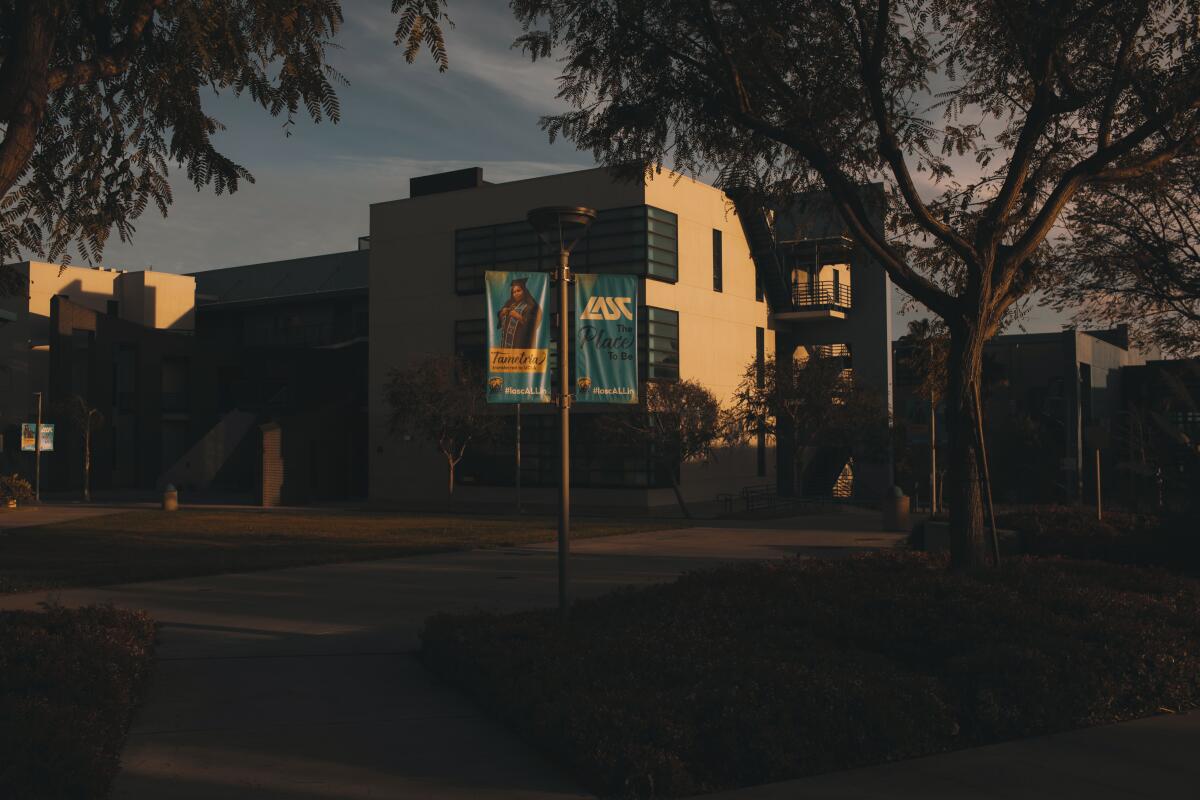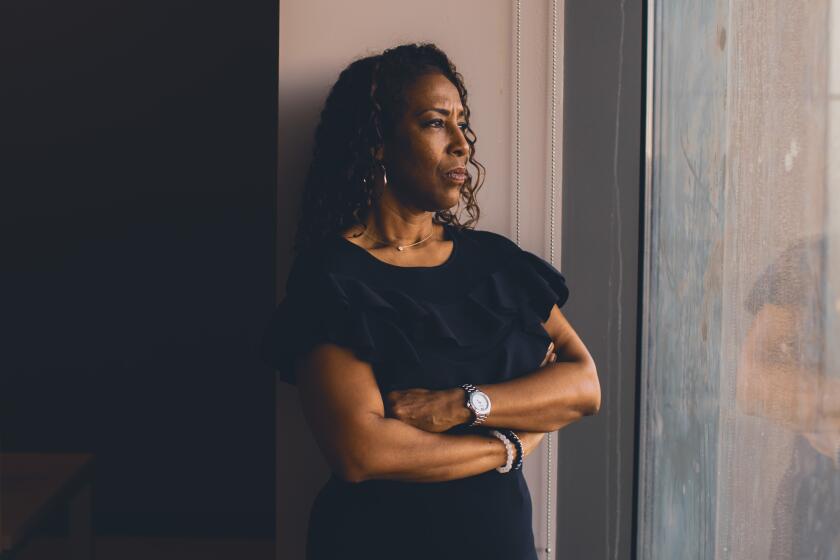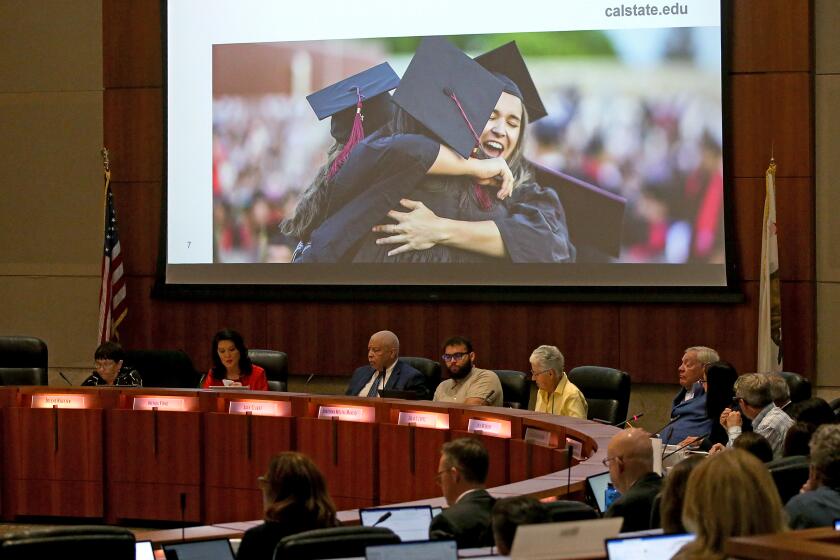Faculty call for overhaul of how L.A. community colleges respond to sexual harassment

Faculty leaders of the state’s largest community college district are calling for an overhaul and a “survivor-centered approach” to how the Los Angeles system responds to sexual harassment complaints after a jury awarded $10 million to a professor who accused a high-ranking administrator of sexual misconduct.
Angela Echeverri, president of the Academic Senate of the Los Angeles Community College District, said the group is also seeking an independent review of the nine-campus system’s sexual harassment policies, even after college officials said they have improved past shortcomings in how complaints are handled.
Echeverri said in an interview she does not believe those actions go far enough.
“I don’t care how many investigators they have, if people are being protected,” she said. “At this point, you really need some external oversight.”
The Academic Senate is still weighing what additional oversight would look like.
In December, the district’s Academic Senate approved a resolution calling on the Board of Trustees to improve efforts to prevent sexual harassment and discrimination by conducting timely and impartial investigations, and taking disciplinary actions if violations are found. The resolution also called on the board to “regularly review its policies and procedures regarding sexual harassment and discrimination to ensure their effectiveness and compliance.”
Sabrena Turner-Odom wanted to give back to her alma mater. Instead, she’s in a contentious lawsuit, alleging a top administrator at the community college sexually harassed her.
The resolution came after the Times published a story in October detailing a civil case against the district in which a jury found it failed to prevent and investigate harassment complaints against Howard Irvin, a former vice president of student services at Los Angeles Southwest College.
The jury also found the district was negligent in hiring Irvin and had retaliated against Sabrena Turner-Odom, an English professor who accused Irvin of sexual harassment and sued the district over its handling of her complaint.
Turner-Odom said Irvin repeatedly made lewd comments and gestures during private meetings at Southwest College. Turner-Odom testified in court that during multiple meetings, she saw him “squirm in his chair and rub his genitals and just make motions that he was trying to please himself as he was speaking.”
The district is appealing the verdict. During the trial, attorneys for the district asserted that Turner-Odom’s allegations could not be proved. It also faces three other ongoing lawsuits over retaliation and discrimination involving Irvin, who was fired from the district at a board meeting in December 2022.
In a statement, the district said it has implemented improvements on how it processes sexual harassment complaints based on recommendations from a 2018 task force.
“LACCD remains unequivocally committed to a zero-tolerance policy for sexual harassment of any kind in our classrooms and workplace, and to fostering a campus climate that promotes respect and civility,” the statement said.
Janice Brown, an attorney representing the district and Irvin, did not respond to a message seeking comment. Irvin could not be reached for comment.
In a letter to the Board of Trustees that shared the resolution, Echeverri cited the Times article and said the trustees and Chancellor Francisco Rodriguez “have yet to explain how the District plans to ensure that faculty, students, and staff are protected from sexual harassment, discrimination, and retaliation.”
California State University was rocked by sexual misconduct scandals. Its most powerful leaders — the Board of Trustees — were not held accountable.
She also said Irvin was recently a finalist for the vice president of student services position at Los Angeles Trade-Technical College, another campus in the district, a development that she said “was met with disbelief, shock, and outrage.”
A district spokesperson, Juliet Hidalgo, said Irvin was not a finalist for the position at Trade Tech, but declined to say how far he went in the interview process.
Echeverri added that the Academic Senate would consider a vote of no confidence against Rodriguez and the trustees at its meeting in February, if administrators do not adequately address concerns about the district’s handling of sexual harassment and discrimination cases.
On Dec. 8, Rodriguez and David Vela, who was then president of the Board of Trustees, sent an email to employees across the district to reaffirm the district’s “commitment to a harassment-free environment,” according to a copy of the email. The email provided an overview of behavior that constitutes sexual harassment, and outlined policies and resources in place to protect and educate employees.
“LACCD remains unequivocally committed to a zero-tolerance policy for sexual harassment of any kind in our classrooms and workplace, and to fostering a campus climate that promotes respect and civility,” the email said.
Days later, during a presentation at a Dec. 13 trustees meeting, Natalie Mason-Kinsey, director of the Office of Diversity, Equity, Inclusion and Accessibility, acknowledged shortcomings in the district’s handling of sexual harassment and discrimination complaints in the past.
Mason-Kinsey, who started in the role about a year ago, said her office has worked to implement the series of recommendations by the 2018 task force created to improve the system’s response to sexual harassment complaints.
One deficiency was rooted in how the district tracked discrimination and harassment complaints, the task force reported. Before the district started using a centralized system for complaints in 2022, Mason-Kinsey said, complaints were logged on Excel spreadsheets or other files where they were not easily tracked.
“I am still looking to make sure that I’ve uncovered all of the cases,” she said. “Record keeping was not where it should be.”
Since starting in the position, Mason-Kinsey said, she’s heard from students and staff who filed sexual harassment or discrimination complaints and never received any follow-up. The office, she said, had become “the place where things came to die.”
The district also hired two senior compliance investigators last year, and is in the process of hiring two more compliance investigators.
“This office is not supposed to make life more difficult for our students or our staff and our faculty,” Mason-Kinsey said. “We are supposed to be helpful. We are supposed to be responsive.”
More to Read
Sign up for Essential California
The most important California stories and recommendations in your inbox every morning.
You may occasionally receive promotional content from the Los Angeles Times.













